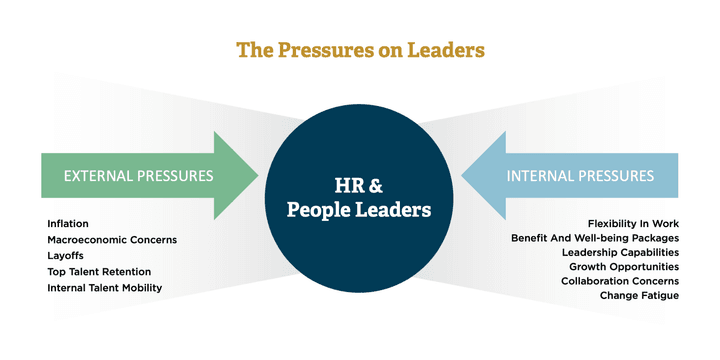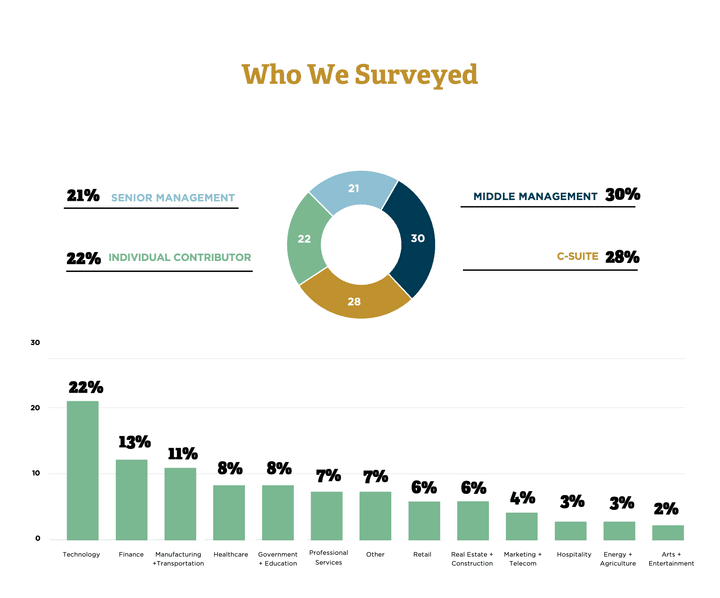# The New Era of Work: Navigating the Changing Landscape
For most organizations, the past several years have been a tumultuous time of accelerated transformation with people and change at the forefront. The COVID-19 pandemic forced companies to prioritize immediate employee support, pivoting rapidly to enable remote work, bolster talent acquisition and engagement amid the Great Resignation, and fast-track digital transformation initiatives. Now, the new era of work requires a shift from reactive to proactive strategies, placing a greater emphasis on fostering company culture and enhancing the employee experience to attract and retain top talent.
The landscape continues to evolve with work trends like quiet quitting, increasing debates around remote versus in-office work, and an intensified focus on economic resilience amidst fears of a potential downturn. Employers are now more scrutinized than ever, balancing the responsibility of supporting employees’ growth and well-being while managing external pressures like large-scale layoffs and succession planning.
No organization is spared from change; it’s the one constant in the workplace. The goal of our annual People & Change Insights eBook is to arm leaders with data on the latest people trends while providing resources and actionable recommendations on how to engage and inspire employees through times of heavy change and uncertainty — and, more importantly, enable future resiliency.
# Leadership Under Pressure: Supporting People Leaders in Times of Change
The pressures and ripple effects of rapid workplace changes have taken their toll on employees and the people leaders who manage them. Human resources and leadership roles are increasingly asked to do more as companies navigate the complex landscape of change and performance expectations. In the new era of HR, all eyes are on management to understand how they will meet business goals while fostering a positive and adaptable workplace culture. From the CEO to the individual contributor, there needs to be a clear line of communication and openness about these issues and the plan to address them. By employing effective change management principles, leaders can prepare for organizational change trends, reinforce their teams, and deploy mitigation plans across all levels.
Related Content: The Power of Innovative Leadership

# Survey Background: The Champions Behind the Change
Each year, we publish our People & Change Insights eBook, drawing from extensive survey data to provide leaders with insights into evolving workplace dynamics and the most pressing organizational change trends. Our 2023 edition provides a comprehensive look at post-pandemic workplace adjustments and challenges for adapting to the future of work, providing actionable guidance to help leaders build resilient, adaptable organizations.
About the eBook and Survey
- 400+ US-based professionals surveyed
- Conducted by an independent survey firm
- Enriched with Propeller’s expertise in managing client transformations

In 2022, we saw trends on full-scale organizational transformations and concurrent people investments, people investments on learning and development and evolving work models, the importance of project sponsorship for effective change management, and the employee engagement and retention problems in a hybrid/remote model.


# Key Work Trends in 2023: Preparing for Another Year of Transformation
Download the 2023 People & Change Insights eBook to dive into four key workplace trends shaping the new era of work. Learn practical actions you can take to prepare your employees and managers for another year of continuous adaptation.
Here’s what we’re looking at:
# 1. The Paradox of Change
While the intensity of change initiatives has slowed compared to previous years, employees still report feeling more change-saturated than ever, leaving leaders questioning how much more their teams can handle. With this growing saturation, it’s crucial to find balance in pacing new initiatives to prevent burnout. But where is the line between resilience and overload?
Related Content: Navigating Change Fatigue: Data-Driven Strategies for Leaders
# 2. Technology Transformation
Digital transformation is essential but daunting, as projects often bring visibility without a clearly defined, long-term vision. Employees may struggle to see how these changes fit into the organization’s future, leading to low engagement or frustration. Effective technology integration demands careful planning to bridge today’s needs and future goals — but getting there without derailing the team requires plenty of strategy.
# 3. The Evolution of Remote Work
Remote work isn’t becoming the future we envisioned — instead, companies are getting creative with hybrid options. Employees want flexibility, yet organizations must maintain culture and cohesion, often without in-person touchpoints. Striking a balance is a constant negotiation between efficiency and employee needs, with evolving expectations making it even harder to know what’s sustainable.
# 4. Strain on Middle Management
New workforce models have placed a disproportionate strain on middle management, where daily pressures from upper management and direct reports converge. Managers are now expected to deliver results, support engagement, and bridge gaps between remote and in-person staff—all while keeping morale high. How can managers effectively juggle these responsibilities without risking their own burnout?
# Strategies for Success: Helping Your People Thrive Amidst Change
The pandemic may be in the rearview, but the ripple effects, changing economic climate, and subsequent new challenges facing people leaders will continue to grow if left unaddressed. To stay competitive in 2023, organizations must embrace an all-encompassing change management strategy that deals with internal and external pressures, tackles change fatigue, supports cross-collaboration, aligns projects to business goals, and empowers middle managers to lead and inspire in their evolving work models.
Change may be constant, but you’ve got what it takes to support your teams through the challenges of transformation. By fostering resilience, cross-functional collaboration, and a positive organizational culture, leaders can position their organizations for sustainable success, no matter what the coming years bring.
View our 2023 People & Change Insights eBook to gain deeper knowledge and chart a sustainable path forward. And, if you’re looking for more information on tackling change, maintaining employee engagement, and confidently moving forward, contact us to get the conversation started.




